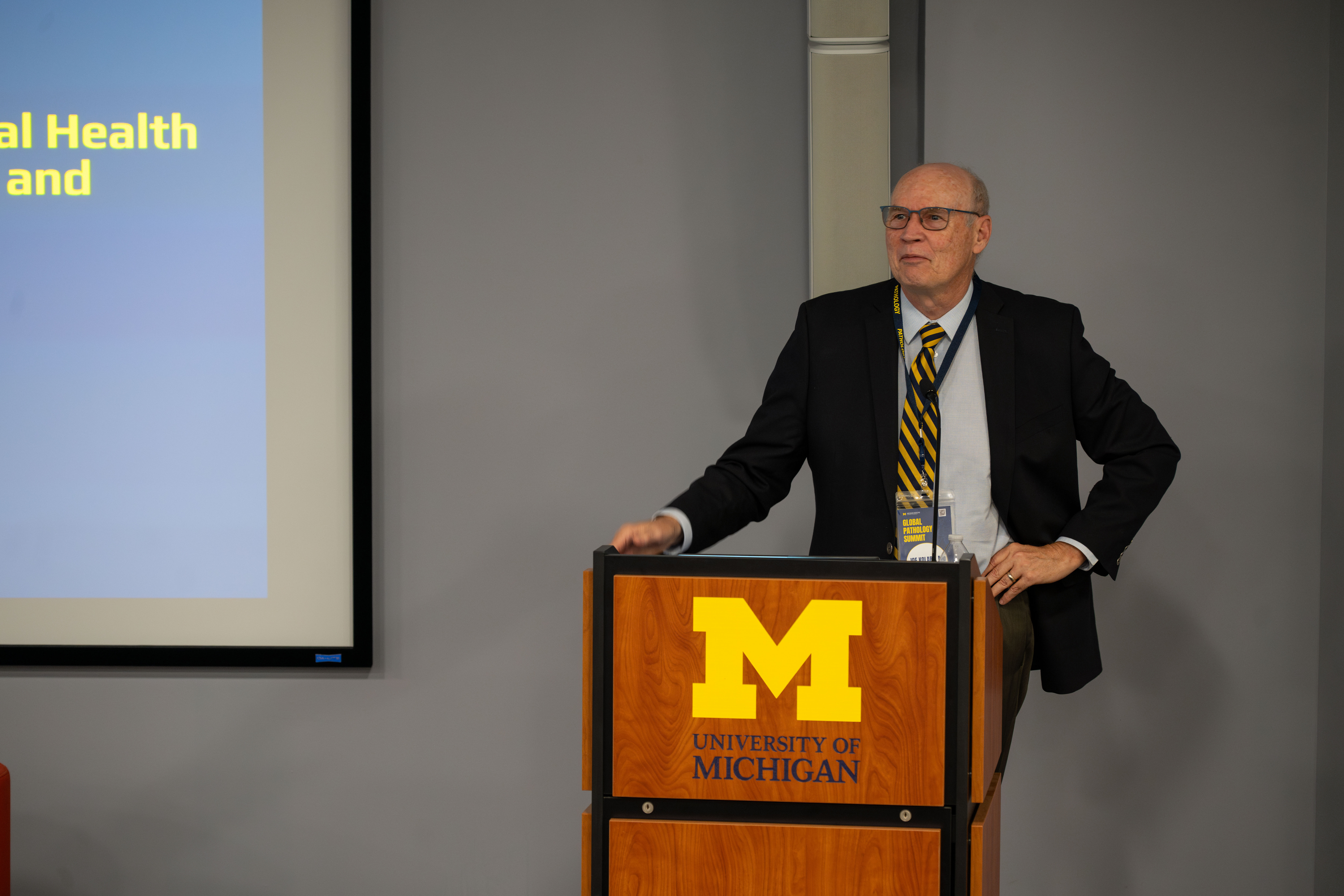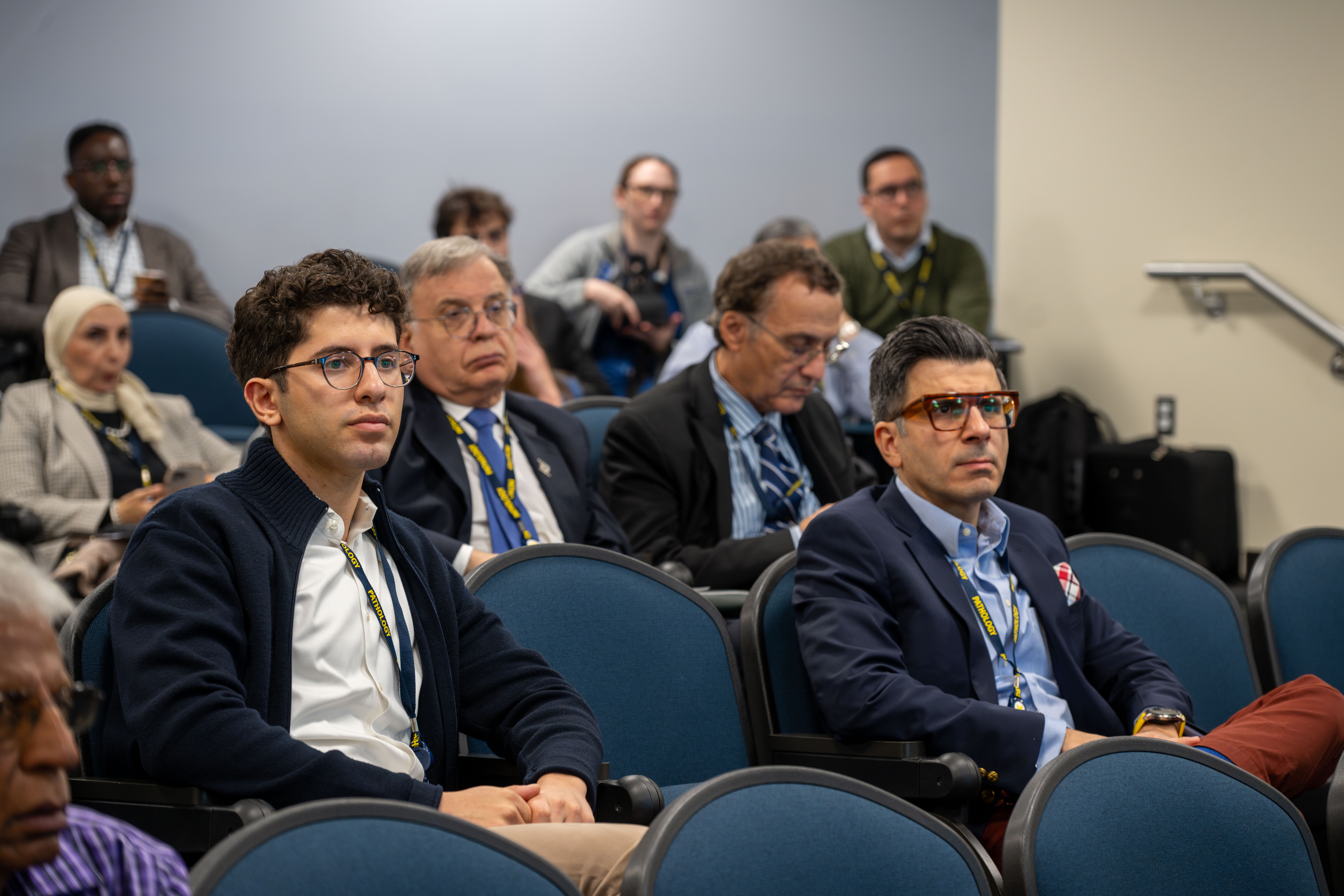

The Department of Pathology recently hosted its first Global Pathology Summit, marking a significant step in addressing health disparities through advancements in pathology. Dr. Rouba Ali-Fehmi, the summit director, welcomed attendees and highlighted the essential role of global pathology in healthcare, the transformative potential of digital pathology and artificial intelligence (AI), and the importance of sustainable partnerships.
 Dr. Ali-Fehmi emphasized the need for global pathology and expressed optimism for future collaborations. She stressed the necessity of interactive participation and thanked the organizing team, Drs. Lee Schroeder, Ulysses Balis, Kamran Mirza, and Marya Wahidi, for making the summit possible. Keynote speakers, including Dr. Jeffrey Myers and Dr. Joseph Kolars, echoed Ali-Fehmi’s sentiments by underscoring pathology’s critical role in clinical care and medical education.
Dr. Ali-Fehmi emphasized the need for global pathology and expressed optimism for future collaborations. She stressed the necessity of interactive participation and thanked the organizing team, Drs. Lee Schroeder, Ulysses Balis, Kamran Mirza, and Marya Wahidi, for making the summit possible. Keynote speakers, including Dr. Jeffrey Myers and Dr. Joseph Kolars, echoed Ali-Fehmi’s sentiments by underscoring pathology’s critical role in clinical care and medical education.
The keynote speakers and panelists pointed out significant diagnostic service gaps in low- and middle-income countries, highlighting the urgency for improved global pathology infrastructure. In their remarks, they discussed the importance of integrating pathology at the forefront of healthcare services and the need to harness Artificial Intelligence and data science to enhance global diagnostic capacities.
The first of three panel discussions titled, “What is Global Pathology and How Can It Address Health Disparities?” featured insights from panelists Dr. Wael Sakr, Dean, Wayne State University School of Medicine; Dr. Ghazi Zaatari, Chair of Pathology, American University of Beruit; Dr. Ernest Kenu, Professor, University of Ghana; and Dr. Tim Amukele, Medical Director, Icon Clinical Research Inc. Each shared valuable perspectives on global pathology and various approaches to addressing health disparities. Dr. Sakhr highlighted the educational discrepancies in pathology services between regions. Dr. Zaatari discussed establishing international standards and using technology to enhance pathology practice globally. Dr. Kenu emphasized timely diagnostics and the role of partnerships in low-resource settings, while Dr. Amukele focused on the evolving roles of pathologists supporting local health systems abroad.
Dr. Patricia Garcia from Cayetano Heredia University in Peru shared an insightful presentation on the crucial role of diagnostics in global health. She highlighted that nearly half of the world’s population lacks access to essential diagnostics. Her presentation stressed that diagnostics are vital for effective healthcare systems and responses to pandemics, with a specific focus on overcoming infrastructure and financial barriers.
 Another panel discussed leveraging data, AI, and digital pathology for global health. Drs. Omar Baba, Ernest Adjei, Ghazi Zaatari, and Akbar Waljee explored the infrastructural needs before implementing AI, sharing practical experiences and challenges from different regions. The conversation highlighted the need to balance technological advancements with human expertise and to address infrastructure and policy barriers to maximize the benefits of AI and digital pathology. They also underscored the importance of funding medical equipment and maintaining infrastructure in low-resource settings. The panel agreed on the necessity of inclusive data sets to hone diagnostic algorithms and called for careful consideration of ethical and legal challenges, particularly in data privacy.
Another panel discussed leveraging data, AI, and digital pathology for global health. Drs. Omar Baba, Ernest Adjei, Ghazi Zaatari, and Akbar Waljee explored the infrastructural needs before implementing AI, sharing practical experiences and challenges from different regions. The conversation highlighted the need to balance technological advancements with human expertise and to address infrastructure and policy barriers to maximize the benefits of AI and digital pathology. They also underscored the importance of funding medical equipment and maintaining infrastructure in low-resource settings. The panel agreed on the necessity of inclusive data sets to hone diagnostic algorithms and called for careful consideration of ethical and legal challenges, particularly in data privacy.
Dr. Wael Sakr later presented on the profound impact of international exchange programs. These programs facilitate collaboration on clinical and research fronts, significantly enhancing global epidemiological studies and medical education. The summit repeatedly emphasized the crucial role of students and early-career professionals in global health initiatives. Engaging this demographic through practical experiences and research projects was seen as essential for cultivating the next generation of global health leaders.
The Global Pathology Summit was deemed a resounding success, bringing attention to key areas necessary for advancing global health through pathology. These include forging robust partnerships, raising awareness about pathology’s importance, ensuring sustainable and capacity-building initiatives, and leveraging AI and digital advancements responsibly.
Sustaining these collaborative efforts and building a strong global pathology network will be key to advancing these objectives in the future. The session concluded with a call to action, encouraging participants to contribute further ideas and collaborate on future initiatives. The determined and collaborative spirit at the summit foreshadows impactful strides toward addressing global health disparities through pathology in the coming years.